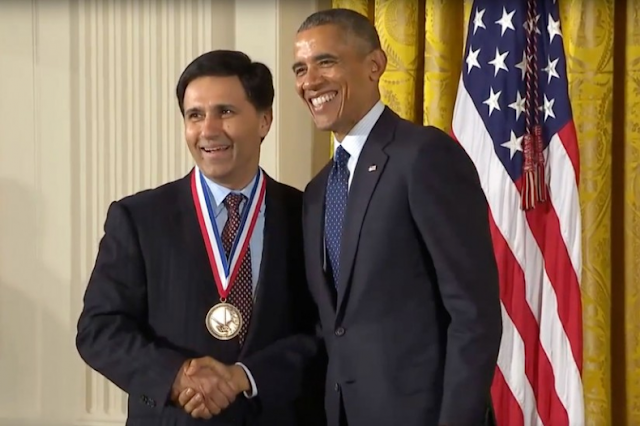PakAlumni Worldwide: The Global Social Network
The Global Social Network
Pakistani-American Wins Top US Medal of Technology
President Obama has honored Dr. Mark Salman Humayun of Pakistani origin with the National Medal of Technology and Innovation at a White House ceremony recently, according to a USC Eye Institute press release.
Dr. Humayun's "bionic eye" offers a solution for those who have the inherited retinal degenerative disease retinitis pigmentosa (RP). Known as the Argus II, it uses a camera mounted on special glasses that sends a signal to an electronic receiver with electrodes that are implanted in and around the eye. The electrodes send signals to the retina that stimulate the retina and then these retinal impulses travel through the optic nerve to the brain where they are interpreted as images.
Dr. Humayun's "bionic eye" received approval from the FDA in the U.S. in 2013 and since then the USC Eye Institute has been one of the centers of excellence for patients receiving this implant. Dr. Humayun has trained ophthalmologic surgeons worldwide in implanting the Argus device that has been in use in Europe since 2011 and was also recently approved for implantation in Australia, according to USC Keck Institute.
Born in Pakistan, Dr. Mark Salman Humayun is grandson of Quaid-e-Azam Mohammad Ali Jinnah's personal physician Dr. Ilahi Bakhsh, according to a story by Anjum Niaz of Pakistan's Dawn newspaper. Dr. Humayun now leads the USC Eye Institute at the University of Southern California in Los Angeles where he is Professor of Ophthalmology and Biomedical Engineering. The Humayun family came to America in 1972. Dr. Humayun received his MD degree from Duke University, a PhD in Biomedical Engineering from University of North Carolina followed by clinical training in ophthalmology at Duke Medical Center as well as the Johns Hopkins Hospital.
Dr. Humayun with President Obama at White House Award Ceremony |
The news of Dr. Humayun's achievement comes on the heels of another Pakistani-American Dr. Nergis Mavalwala's contribution to discovery of gravitational waves that has been widely recognized. Mavalvala and her colleagues are credited with developing an ultrasensitive telescope designed to catch glimpses of gravitational waves. Albert Einstein predicted the existence of these ripples in spacetime nearly a century ago, but they haven’t been observed directly yet, according to the Science Magazine. Theoretically a consequence of violent cosmic events—the collisions of black holes, the explosive deaths of stars, or even the big bang—gravitational waves could provide a brand new lens for studying the universe, according to the magazine.
Related Links:
Related Links:
Pakistani-Americans in Silicon Valley
Pakistani Diaspora World's 7th Largest
Pakistani-American Population Second Fastest Growing Among Asian-Am...
Organization of Pakistani-American Entrepreneurs
Karachi-born Triple Oscar Winning Graphics Artist
Pakistani-American Ashar Aziz's Fire-eye Goes Public
Two Pakistani-American Silicon Valley Techs Among Top 5 VC Deals
Pakistani-American's Game-Changing Vision
Minorities Are Majority in Silicon Valley
US Promoting Venture Capital; Private Equity in Pakistan
Pakistani-American Population Growth Second Fastest Among Asian-Ame...
Twitter Feed
Live Traffic Feed
Sponsored Links
South Asia Investor Review
Investor Information Blog
Haq's Musings
Riaz Haq's Current Affairs Blog
Please Bookmark This Page!
Blog Posts
India-Israel Axis Threatens Peace in South Asia
The bonhomie between Israeli Prime Minister Netanyahu, an indicted war criminal, and Indian Prime Minister Narendra Modi, accused of killing thousands of Muslims, was on full display this week in Israel. Both leaders committed to supporting the Afghan Taliban regime which is accused of facilitating cross-border terrorist attacks by the TTP in Pakistan. Mr. Modi was warmly welcomed by…
ContinuePosted by Riaz Haq on February 27, 2026 at 10:45am — 1 Comment
Modi's AI Spectacle: Chaos and Deception in New Delhi
The India AI Impact Summit 2026, held at Bharat Mandapam in New Delhi, has been marred by chaos, confusion and deception. The events on the ground have produced unintended media headlines for India's Prime Minister Narendra Modi who wants to be seen as the "vishwaguru" (teacher of the world) in the field of artificial intelligence as well. First, there was massive chaos on the opening day, with long…
ContinuePosted by Riaz Haq on February 19, 2026 at 12:00pm — 13 Comments
© 2026 Created by Riaz Haq.
Powered by
![]()


You need to be a member of PakAlumni Worldwide: The Global Social Network to add comments!
Join PakAlumni Worldwide: The Global Social Network